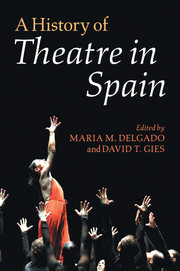Book contents
- Frontmatter
- Contents
- Illustrations
- Contributors
- Acknowledgements
- Introduction
- 1 The challenges of historiography
- 2 Lope de Vega, Calderón de la Barca and Tirso de Molina
- 3 The world as a stage
- 4 Playing the palace
- 5 The art of the actor, 1565–1833
- 6 Theatrical infrastructures, dramatic production and performance, 1700–1759
- 7 Popular theatre and the Spanish stage, 1737–1798
- 8 Theatre of the elites, neoclassicism and the Enlightenment, 1750–1808
- 9 Actors and agency in the modern era, 1801–2010
- 10 Zarzuela
- 11 Nineteenth-century Spanish theatre
- 12 Copyright, buildings, spaces and the nineteenth-century stage
- 13 Modernism and the avant-garde in fin-de-siècle Barcelona and Madrid
- 14 Continuity and innovation in Spanish theatre, 1900–1936
- 15 Theatrical activities during the Spanish Civil War, 1936–1939
- 16 Theatre, colonialism, exile and the Americas
- 17 Theatre under Franco (1939–1975)
- 18 Flamenco
- 19 Nationalism, identity and the theatre across the Spanish state in the democratic era, 1975–2010
- 20 Directors and the Spanish stage, 1823–2010
- 21 This evolution is still ongoing
- 22 Theatre as a process of discovery
- 23 Theatre is the art of the future
- Select bibliography
- Index
- References
16 - Theatre, colonialism, exile and the Americas
Published online by Cambridge University Press: 05 June 2012
- Frontmatter
- Contents
- Illustrations
- Contributors
- Acknowledgements
- Introduction
- 1 The challenges of historiography
- 2 Lope de Vega, Calderón de la Barca and Tirso de Molina
- 3 The world as a stage
- 4 Playing the palace
- 5 The art of the actor, 1565–1833
- 6 Theatrical infrastructures, dramatic production and performance, 1700–1759
- 7 Popular theatre and the Spanish stage, 1737–1798
- 8 Theatre of the elites, neoclassicism and the Enlightenment, 1750–1808
- 9 Actors and agency in the modern era, 1801–2010
- 10 Zarzuela
- 11 Nineteenth-century Spanish theatre
- 12 Copyright, buildings, spaces and the nineteenth-century stage
- 13 Modernism and the avant-garde in fin-de-siècle Barcelona and Madrid
- 14 Continuity and innovation in Spanish theatre, 1900–1936
- 15 Theatrical activities during the Spanish Civil War, 1936–1939
- 16 Theatre, colonialism, exile and the Americas
- 17 Theatre under Franco (1939–1975)
- 18 Flamenco
- 19 Nationalism, identity and the theatre across the Spanish state in the democratic era, 1975–2010
- 20 Directors and the Spanish stage, 1823–2010
- 21 This evolution is still ongoing
- 22 Theatre as a process of discovery
- 23 Theatre is the art of the future
- Select bibliography
- Index
- References
Summary
Whilst the pervasiveness of Spanish peninsular theatre in Latin America is somewhat of a commonplace, the very extent of its influence right up to the present day has made it difficult to produce a satisfactory cultural history. Most Latin-American theatre histories distinguish the development of separate traditions by virtue of any divergences from this unquestionably dominant model, yet there has been comparatively little attention within peninsular histories to the heterogeneous effects of the long history of theatrical activities by Spanish dramatists, actors, scenographers, directors and companies in the Americas. Despite recognition that the ‘steady traffic of texts, theatre troupes, and even playwrights, ensured that the dramatic fashions of the Motherland held sway in her overseas possessions’, the theatrical voyages undertaken to and from Spain and Latin America are often little more than a footnote in accounts of the careers of particular dramatists, practitioners, genres or periods.
As far as any critical judgement on impact is concerned, the tendency has generally been to remark on the excessive conservatism of colonial theatrical culture; the continuing presence of Spanish theatre models after Independence in the nineteenth and twentieth centuries is often condemned by association. So, for instance, Frank Dauster laments the overwhelming dominance of peninsular Spanish forms on the nineteenth-century Mexican stage, whilst Sandra Cypess declares with confidence of early twentieth-century Latin-American theatre that:
Typically the stage was filled with actors mouthing platitudes in a peninsular accent, dressed in old-fashioned costumes surrounded by out-dated scenery in outmoded theatrical halls. The audiences before which these commercial companies performed were generally bourgeois and upper-class, affiliated with the government, and not overly critical of official political policy.
- Type
- Chapter
- Information
- A History of Theatre in Spain , pp. 323 - 340Publisher: Cambridge University PressPrint publication year: 2012
References
- 1
- Cited by



